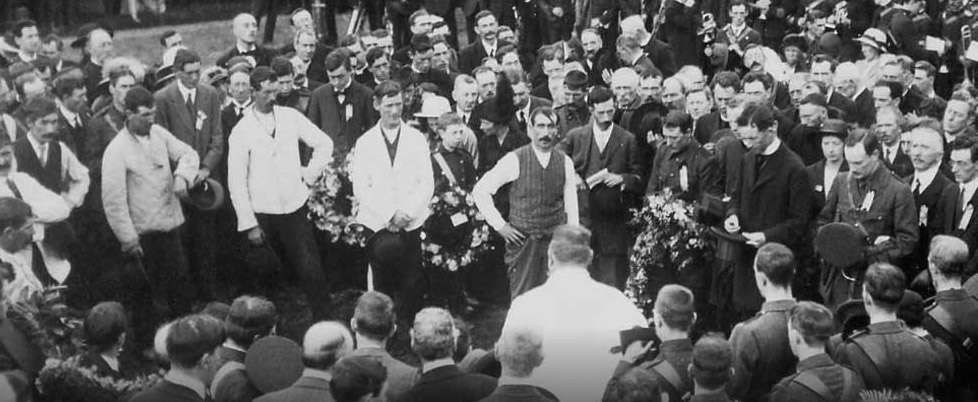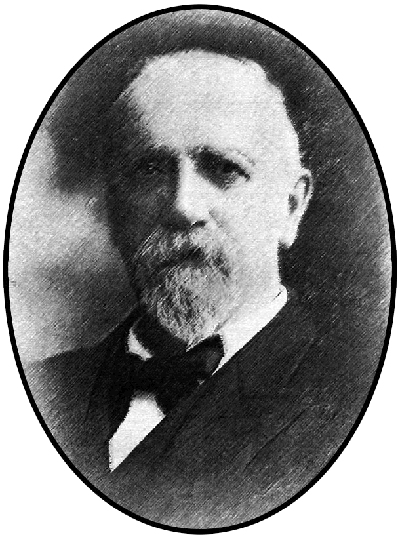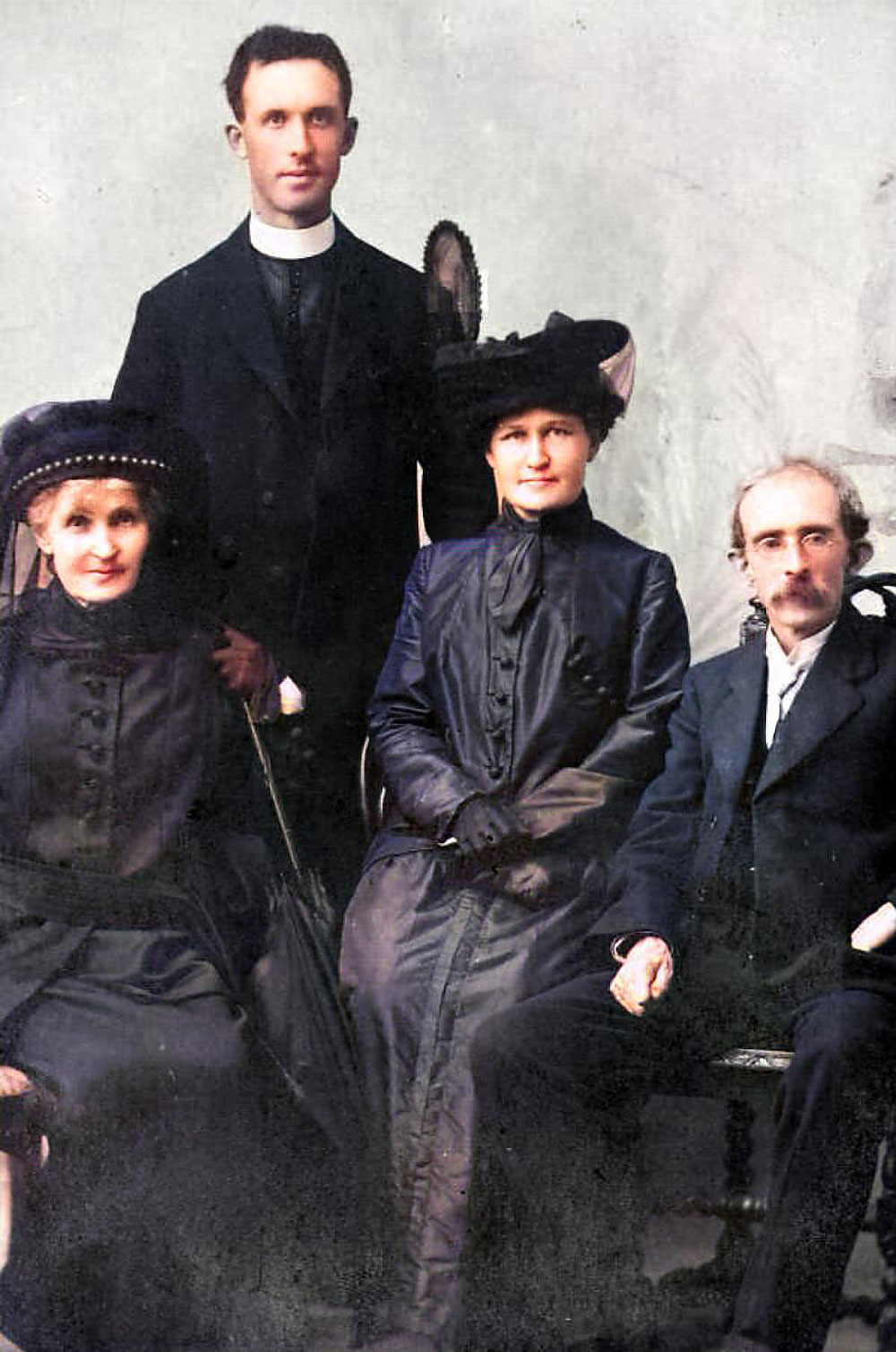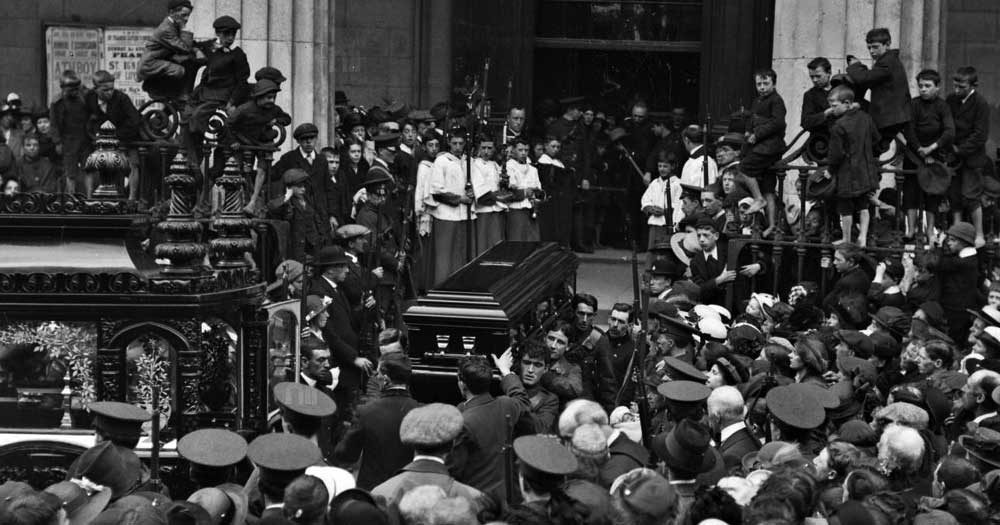
Oration by
Rev. M. O'Flanagan
at Reception of the Remains of Jeremiah O'Donovan Rossa in City Hall.
Men of Ireland:— We have assembled here to-day to welcome to the City Hall of our country's capital the mortal remains of one of the noble felons of our land. He lived to a great old age. His name had already grown into Irish history when most of us were boys. He was one of those who rose in the dark and evil days to right their native land. He was hated by the enemies of Irish nationality, but the measure of their hatred is the measure of our love.
He was a criminal in the eyes of the English government. But his crimes are his title deeds to sainthood in Ireland's patriot litany.
A few days ago our brothers beyond the Atlantic carried his body with love and reverence to the edge of the ocean. Many of the leading Irish citizens of the States were there, to testify to their admiration of his life, and their adhesion to the principles for which he suffered. Men who had been estranged for years, clasped hands again beside the bier of O'Donovan Rossa, and promised to forget ancient feuds and work together for Ireland.
We have received him into Ireland in the same spirit of unity and brotherhood. Many who have been estranged by the extraordinary occurrences of the past year or two will be brought together again over the body of our hero.
We love the name of O'Donovan Rossa, and we purpose to place his remains among those of the noblest of the uncrowned Kings of Ireland, because he typifies to us the spirit of patriotism, the passion of patriotism, and the virtue of patriotism. Patriotism is an instinct, grows up naturally in the hearts of men. But the instinct of patriotism has to be cultivated so as to make it a virtue. O'Donovan Rossa had both the instinct of patriotism and the virtue of patriotism.
And patriotism is composed of two feelings — love of country and hatred for the oppressors of one's country. There was a time when many Irishmen felt as if they were called upon to apologize for the love they bore their country. That time has gone forever and the time is rapidly coming when Irishmen will apologize neither for love nor hatred, because there is no real red blood in the heart of a man who pretends to love his country and who at the same time, pretends not to hate the enemies and oppressors of his country.

O'Donovan Rossa was great in his love of Ireland. But even beyond that love, there stood out still stronger in his character his manly hatred of the oppressors of Ireland; and I hope that the spirit that was his during his long lifetime will be one which will go abroad throughout Ireland, and sink deep into the hearts of the Irish people.
And this love and hatred are both Christian virtues, and virtues which Christian men are bound to cultivate in their hearts. We say, everyday, in our Act of Contrition that we love God and we hate sin; and in a similar way we should say that we love our country and hate any power that would continue to deprive our country of its right to freedom, of its right to live its own life in its own way, free from anything that would cripple its individuality, or that would make it a lifeless, soulless imitation of another land.
Love of country, love of Ireland, means more than love of its hills and its valleys, its rugged mountains and broad plains, and of the sunshine and showers that cross its sweet and tender face. All that is contained in love of country. But love of country contains much more. That is but the physical setting of our patriotism.
Love of country, above all things, means love of its people. It means love of the people of Ireland, not merely as men and women, but as Irish men and women. We are bound to love all men because of those things that are common to all men. But we are bound to love our own people with a special and peculiar love, a love that is not founded upon the common characteristics of the human race, but which is founded upon the special and distinctive character of our own nationality.
We are bound not merely to love them for the things in which they resemble other nations, but still more for those things by which they differ from other nations. And loving them for their own special and distinctive character we are obliged to do everything in our power to secure the free and untrammeled development of all that is good and noble in that character.
Hence there comes with the love we bear the people of Ireland, growing out of that love, a hatred of anything that would destroy our distinctive civilization, which would uproot our language, quench in our hearts a knowledge of the past and which would tell us to remember everything outside of Ireland but to forget the things that are within Ireland.

Ireland has not forgotten through seven hundred years of struggle, and, now, when forces are working in the world, which, once more, bring bright before our eyes the hope that some avenue will be opened up through which Ireland may march to freedom, we are not going to forget.
There never was a time in the history of Ireland when it was more necessary for our people to think for themselves. There are a great many people in Ireland to-day who are afraid to think. But, thanks be to God, they are making a beginning at last, and the old catch-cries and platitudes are not going down the throats of the Irish people as they were a few months ago.
We love O'Donovan Rossa because he was true, to the end of his life, to the principles of his boyhood. And the same love which O'Donovan Rossa had, and which survived six years of brutal treatment in English prisons, remained with him to the end of his life - and with the love there remained the same hatred. Do not believe those who would tell you that he was false to the principles of his youth. Do not believe those who in life hated and oppressed him and who despised all the ideals that were dearest to his heart. Do not believe them when they tell you that he changed in his old age.
Rather, believe those whose love and fidelity tended at his bedside during the long years of his final illness, and to whom his memory is dearer than anything else in life; and they can tell you that the principles of O'Donovan Rossa's old age were the same as those of his youth, and that the Ireland he loved to the end was an Ireland free – absolutely free – from any external control whatever, a nation independent, the equal of any other independent nation in the world.
At the present time, nationality is in the ascendant. Its stock has gone up in the market. Perhaps some of the bidders are hypocrites, but the fact that they are compelled to bid shows that nationality counts for a great deal in the world today.
But the men of Ireland should make it clear that the principles of nationality are no less sacred by the shores of the Atlantic than they are along the slopes of the Carpathians, or by the shores of the Danube; that if we have great powers in the world today who profess that they are fighting for the liberty of small nationalities, and that if these powers are not sincere in their professions, that we shall do our part to tear the mask of hypocrisy from their faces.

Let us not be afraid to love Ireland with all our hearts to-day, nor to give free voice to our love. O'Donovan Rossa was not afraid to do so when it was much more dangerous than it is now. He was, indeed, banished from Ireland for his love of Ireland, and to-day banishment from Ireland is one of the penalties for love of Ireland; but, at least, the banishments which we have to-day have not, so far, brought in their train the savage treatment meted out to O'Donovan Rossa.
Let his spirit be amongst us! Let us try to emulate his courage! Let us be fearless! All over Europe, men are laying down their lives through love of their country, and shall it be said that Irishmen are the only men in Europe who are not prepared to risk danger, trials and sacrifice through love of their old historic land?
We require in Ireland today, the very best affections of the Irish people. We require their very best thought and their very best care. The love of country that is not restrained, that is not guided by reason, that does not take into account all that may be gained from a knowledge of the past in steering the future — such love may do injury instead of benefit. But let us not be afraid to face the problem squarely, and to make up our minds as men what attitude men should take up.
Let us be united. We cannot have absolute unity — it is not to be found in any country. But at least, let us have substantial unity, such unity as is feasible in the circumstances, and there is no reason why we should not lift up our hearts in hope for the future and believe the coming of the remains of heroic O'Donovan Rossa amongst us may be the starting point of a new epoch in the history of Ireland.
"Oh, never fear for Ireland, boys,
For she has soldiers still."
Background to the funeral
of Jeremiah O'Donovan Rossa:
At 2.25 pm on Sunday 1st August 1915 the coffin of Jeremiah O'Donovan Rossa was placed on a hearse led by four horses and departed for Glasnevin Cemetery. The St. James's Band, followed by Dublin members of the Irish Volunteers and their mounted section led. The hearse followed, flanked by a guard of honor comprising of veterans of the Fenian movement and members of the Irish Volunteers, Irish Citizen Army and Fianna Éireann. Rossa's widow and daughter came next in a carriage accompanied by Father Michael O'Flanagan who was to conduct the service.
The funeral procession turned onto George's Street and made their way to St. Stephen's Green, down Dawson Street to College Green and across the Liffey, making their way to Parnell Square. From here the cortege cut across to the Phibsborough Road and continued on towards Glasnevin Cemetery.
Footage of the centenary of the funeral in 2015.
The crowd following the hearse was estimated at 5,000 and it took just under one hour for the cortege to march past a fixed point. It was also estimated that about ten times that figure lined the streets on the way to the cemetery.
Given the scale of the procession and the distance it covered it was understandable that it took over three hours to reach the gates of the cemetery arriving at 6pm. Thousands of people gathered at the entrance but admittance was regulated and ticketed by the organizers. The remains of Rossa were brought into the mortuary chapel under the shadow of the O'Connell tower and prayers were recited. The coffin was then carried the short distance to the grave. Those admitted to the graveside formed a square and Father O'Flanagan recited the burial service and prayers in Irish. When he was finished Pádraig Pearse stepped forward to deliver the funeral oration, a speech that would leave its mark on Irish history.
As Pearse finished the crowd stood in silence for some moments before breaking into applause and cheers. Then, in a further act of defiance, the firing party stood forward and fired three volleys over the grave, followed by the Last Post.
Many would later see those volleys as the first shots of the 1916 Rising and as Pearse dictated a new generation had at this moment stepped forward, aware of their predecessors but determined to shape their own destiny. Glasnevin Trust 2015.
